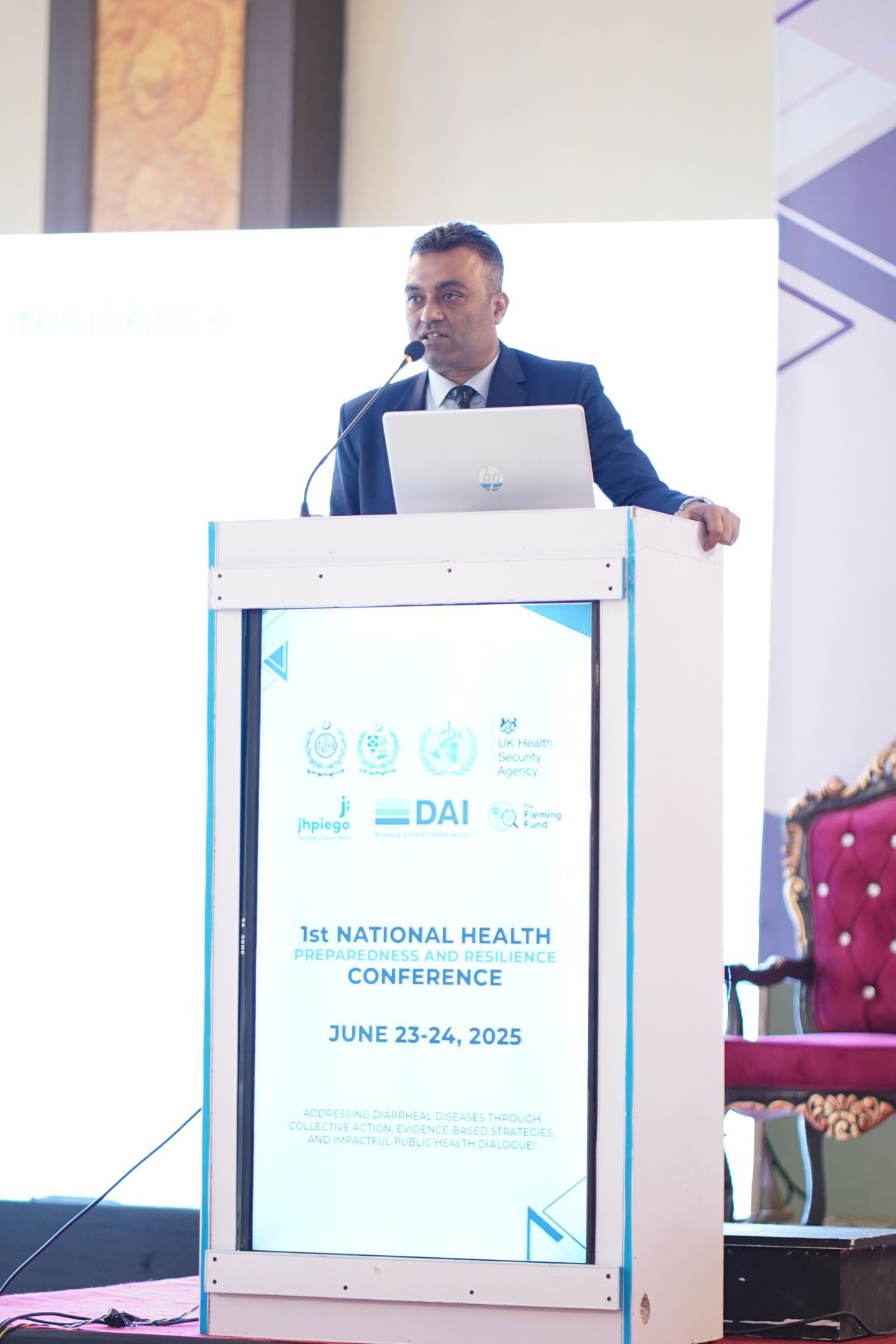
Pakistan’s inaugural National Health Preparedness and Resilience Conference, hosted at the National Institute of Health (NIH) in Islamabad on 23-24 June, brought together national and international experts, policymakers and technical professionals to tackle “Diarrhoeal Diseases: Challenges, Innovations, and Public Health Strategies.”
The two-day event focused on building stronger systems to prevent and respond to waterborne diseases – one of the country’s most pressing public health challenges - marking an important step in Pakistan's efforts to strengthen its health security capabilities.
Sharing IHR-SP’s experience and expertise
The UK Health Security Agency (UKHSA) International Health Regulations Strengthening Project (IHR-SP) contributed technical expertise across multiple sessions, demonstrating how international partnerships can support local health priorities.
Dr Muhammad Sartaj, UKHSA IHR-SP Country Lead for Pakistan emphasised the importance of sustainable approaches in both the opening and closing sessions:
“As we move from crisis response to building sustainable systems, it is our responsibility to embed integrity, coordination, and strategic foresight into every layer of decision-making.”
The UKHSA IHR-SP team’s contributions also included a presentation on disease surveillance data by Dr Zeeshan Baig, IHR-SP Pakistan Surveillance Lead, who outlined the national burden of diarrhoeal diseases. Dr Paul Cleary, IHR-SP UK Surveillance Technical Adviser shared insights on digital innovation, highlighting how real-time data integration can strengthen outbreak response and improve coordination across sectors. Finally, Dr Sartaj also presented on the importance of local leadership, accountability, and governance in driving meaningful health system improvements alongside other thought leaders.
Through these sessions and across the conference programme, several cross-cutting themes emerged, including advancements in disease surveillance and laboratory testing, public health nutrition and food safety, innovations in vaccine and drug research, and the importance of policy advocacy and community engagement. These themes reflected a shared commitment to strengthening health systems through collaboration, innovation, and evidence-based approaches.
Aligning IHR-SP’s international expertise with Pakistan’s national health priorities
The conference also provided the opportunity to engage in strategic discussions. Dr Sartaj met with key figures including the Director General of Health from the Ministry of National Health Services, the WHO Pakistan Deputy Representative, Jhpiego Country Lead, the State Minister for Health and the Federal Health Minister to discuss ongoing collaboration and alignment of IHR-SP’s international expertise with Pakistan’s national health priorities. This included the establishment of Integrated Disease Surveillance and Response (IDSR) and laboratory networks across Pakistan.
Final reflections
The first National Health Preparedness and Resilience Conference concluded with clear future priorities: improving data integration across health programmes, expanding digital infrastructure, strengthening early warning systems, establishing coordinated laboratory networks, promoting collaboration across sectors and improve governance through inclusive and strategic partnerships. The event laid a strong foundation for continued progress in this area.
Dr Muhammad Sartaj reflected on the conference saying, “Pakistan has demonstrated real leadership in organising this conference and bringing together experts to tackle one of the country’s most pressing public health challenges. We’re honoured that UKHSA IHR-SP could contribute our technical expertise to support Pakistan’s own vision for stronger health preparedness. This collaborative approach goes beyond sharing technical knowledge and demonstrates how with strong partnerships, we can collectively build a strong foundation for the future. UKHSA’s IHR-SP stands ready to support Pakistan's continued leadership in this area in implementing priorities from the conference.”
Image: Dr Zeeshan Baig, IHR-SP Pakistan Surveillance Lead speaking at the conference. Image credit: NIH Pakistan
Also By
- First-of-its-kind Community-Based Surveillance Training in Mardan to Boost Pakistan’s Disease Preparedness and response
- Emergency disease surveillance system in action for recurrent floods in Pakistan
- Expanding Sindh’s Integrated Disease Surveillance and Response Network (IDSR) Laboratory Network to private laboratories


Please Sign in (or Register) to view further.